|
|
|
Sort Order |
|
|
|
Items / Page
|
|
|
|
|
|
|
| Srl | Item |
| 1 |
ID:
068747
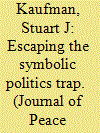

|
|
|
| 2 |
ID:
134444
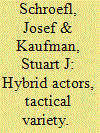

|
|
|
|
|
| Summary/Abstract |
Wars like those in Iraq and Afghanistan should be understood as hybrid wars, wars in which elements of ethnic or tribal conflict, ideologically based insurgency, factional squabbling, and organized crime are inextricably intertwined, with the same actors playing multiple and partially conflicting roles. Hybrid war is inherently transnational, featuring transnational crime networks, “migrant warriors,” transnational diaspora links, legitimate international trade, and foreign intervention. It takes place in hybridized states reliant on local warlords and other actors whose power prevents effective state-building. In this context, while counterinsurgency doctrine prescribes appropriate military strategy and tactics, the core problem is more political than military. Since a hybridized client state is not likely to be politically reformable even if a foreign ally achieves military success, outside allies like the United States should generally refrain from boots-on-the-ground intervention, pursuing instead a diplomatic solution, even though such a deal is likely to be unpalatable.
|
|
|
|
|
|
|
|
|
|
|
|
|
|
|
|
| 3 |
ID:
187146
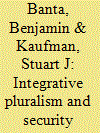

|
|
|
|
|
| Summary/Abstract |
The idea of integrative pluralism offers a promising path for the development of theory in international security and international relations. Instead of either trying to shoehorn all theorising into a single, limited paradigm or giving up entirely on theoretical progress, the integrative pluralist approach calls for bringing diverse approaches together. More precisely, integrative pluralism involves explaining specific phenomena by linking causal processes across multiple layers of reality, and then using the findings to inform broader theoretical constructs such as IR theory paradigms. Elements of the integrative pluralism approach are already visible in the work of mainstream scholars such as Snyder and Katzenstein, as well as of critical scholars such as Sjoberg and Hansen, but the field has tended to overlook these scholars’ efforts at theoretical integration. To more explicitly develop integrative pluralism for our field, this article first draws on critical realist philosophy and social theory. It then illustrates how further steps in this direction might be taken, in particular by highlighting the integrative pluralist aspects of Kaufman's applications of symbolic politics theory to explaining ethnic conflict and war more generally.
|
|
|
|
|
|
|
|
|
|
|
|
|
|
|
|
| 4 |
ID:
091788
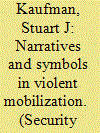

|
|
|
|
|
| Publication |
2009.
|
| Summary/Abstract |
According to symbolic politics theory, group fears and narratives of group identity that justify hostility are key causes of violent ethno-national conflict. In the Palestinian-Israeli conflict, widely accepted narratives on each side define group identity and group relations in ways that generate incompatible demands on Jerusalem, territory, refugees, security, and other issues. Historical memories of the Holocaust, the Nakba, and other tragedies generate fears of extinction on both sides, and stereotypes encourage beliefs on each side that the other responds only to force. These narratives enable hard-line leaders on both sides to manipulate emotive symbols to block compromise and escalate conflict. Thus the cause of both the failure of Palestinian-Israeli negotiations in 2000-01 and the simultaneous outbreak of the latest Palestinian-Israeli war lies in the irreconcilable demands that are rooted in each side's competing narratives of national identity.
|
|
|
|
|
|
|
|
|
|
|
|
|
|
|
|
| 5 |
ID:
053080


|
|
|
|
|
| Publication |
May-June 1996.
|
|
|
|
|
|
|
|
|
|
|
|
|
|
|
|
| 6 |
ID:
069581


|
|
|
| 7 |
ID:
109575
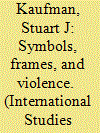

|
|
|
|
|
| Publication |
2011.
|
| Summary/Abstract |
This article examines the utility of opportunity theory, framing analysis, and symbolic politics theory in explaining the causes of ethnic war, focusing on the 1970s Mindanao case. Opportunity variables are present as expected, but process-tracing shows they do not operate according to the hypothesized mechanisms. The framing approach identifies several important dynamics. The resonance of frames was influenced by the salience of the issue highlighted, the narrative fidelity of the frame to preexisting cultural beliefs, the credibility of leaders proposing them, and processes of frame bridging. Symbolic politics theory offers the most complete explanation, embracing most of the alternative explanations' insights while filling in their logical gaps. The symbolist analysis begins with group myths justifying hostility on both sides, the result of past Christian-Muslim warfare. Combined with fears of group extinction, opportunity factors, and hostile popular attitudes, these myths enabled group elites to manipulate emotive symbols to justify mobilization against the other group, creating a security dilemma spiral that resulted in the outbreak of war.
|
|
|
|
|
|
|
|
|
|
|
|
|
|
|
|
| 8 |
ID:
077412
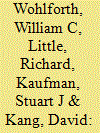

|
|
|
|
|
| Publication |
2007.
|
| Summary/Abstract |
The balance of power is one of the most influential theoretical ideas in international relations, but it has not yet been tested systematically in international systems other than modern Europe and its global successor. This article is the product of a collective and multidisciplinary research effort to redress this deficiency. We report findings from eight new case studies on balancing and balancing failure in different international systems that comprise over 2000 years of international politics. Our findings are inconsistent with any theory that predicts a tendency of international systems toward balance. The factors that best account for variation between balance and hegemony within and across international systems lie outside all recent renditions of balance-of-power theory and indeed, international relations scholarship more generally. Our findings suggest a potentially productive way to reframe research on both the European and contemporary international systems.
|
|
|
|
|
|
|
|
|
|
|
|
|
|
|
|
| 9 |
ID:
168551


|
|
|
|
|
| Summary/Abstract |
This article uses Kaufman's symbolic politics theory of ethnic war as the basis for a broader theory integrating most existing insights about the causes of international and civil war. It starts with findings from psychology showing that people are intuitive thinkers whose decisions result less from rational calculation than from symbolic predispositions—biases such as ideology and prejudice. Studies also show that increased feelings of threat lead to increased aggressive attitudes and behavior. Symbolic politics theory explains how individual attitudes can result in collective action using mobilization theory, with social organization and framing by leaders explaining which attitudes become political action. According to symbolist logic, important causes of war include aggressive symbolic predispositions among leaders or mass publics, heightened threat perceptions, and strong political organizations backing aggressive leaders. Crises and enduring rivalries make war more likely because they strengthen hostile predispositions and threat perceptions, thereby promoting mobilization for war. Cooperative transnational ties and democratic political institutions are among the factors that tend to promote peace.
|
|
|
|
|
|
|
|
|
|
|
|
|
|
|
|
|
|
|
|
|